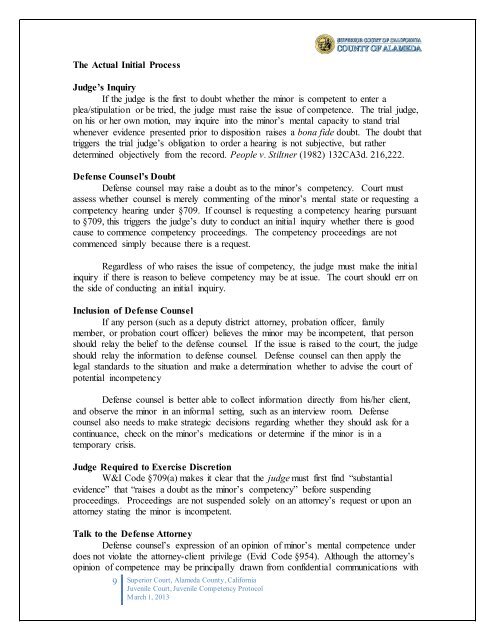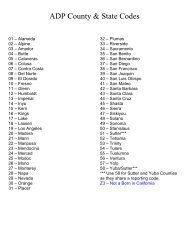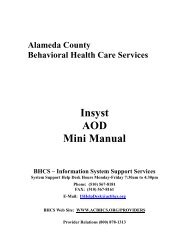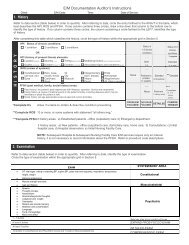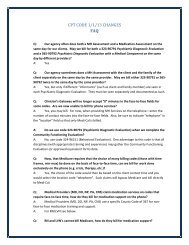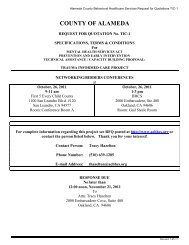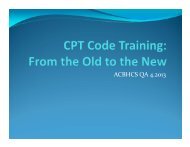Juvenile Competency Protocol - Alameda County Behavioral Health
Juvenile Competency Protocol - Alameda County Behavioral Health
Juvenile Competency Protocol - Alameda County Behavioral Health
Create successful ePaper yourself
Turn your PDF publications into a flip-book with our unique Google optimized e-Paper software.
The Actual Initial Process<br />
Judge’s Inquiry<br />
If the judge is the first to doubt whether the minor is competent to enter a<br />
plea/stipulation or be tried, the judge must raise the issue of competence. The trial judge,<br />
on his or her own motion, may inquire into the minor’s mental capacity to stand trial<br />
whenever evidence presented prior to disposition raises a bona fide doubt. The doubt that<br />
triggers the trial judge’s obligation to order a hearing is not subjective, but rather<br />
determined objectively from the record. People v. Stiltner (1982) 132CA3d. 216,222.<br />
Defense Counsel’s Doubt<br />
Defense counsel may raise a doubt as to the minor’s competency. Court must<br />
assess whether counsel is merely commenting of the minor’s mental state or requesting a<br />
competency hearing under §709. If counsel is requesting a competency hearing pursuant<br />
to §709, this triggers the judge’s duty to conduct an initial inquiry whether there is good<br />
cause to commence competency proceedings. The competency proceedings are not<br />
commenced simply because there is a request.<br />
Regardless of who raises the issue of competency, the judge must make the initial<br />
inquiry if there is reason to believe competency may be at issue. The court should err on<br />
the side of conducting an initial inquiry.<br />
Inclusion of Defense Counsel<br />
If any person (such as a deputy district attorney, probation officer, family<br />
member, or probation court officer) believes the minor may be incompetent, that person<br />
should relay the belief to the defense counsel. If the issue is raised to the court, the judge<br />
should relay the information to defense counsel. Defense counsel can then apply the<br />
legal standards to the situation and make a determination whether to advise the court of<br />
potential incompetency<br />
Defense counsel is better able to collect information directly from his/her client,<br />
and observe the minor in an informal setting, such as an interview room. Defense<br />
counsel also needs to make strategic decisions regarding whether they should ask for a<br />
continuance, check on the minor’s medications or determine if the minor is in a<br />
temporary crisis.<br />
Judge Required to Exercise Discretion<br />
W&I Code §709(a) makes it clear that the judge must first find “substantial<br />
evidence” that “raises a doubt as the minor’s competency” before suspending<br />
proceedings. Proceedings are not suspended solely on an attorney’s request or upon an<br />
attorney stating the minor is incompetent.<br />
Talk to the Defense Attorney<br />
Defense counsel’s expression of an opinion of minor’s mental competence under<br />
does not violate the attorney-client privilege (Evid Code §954). Although the attorney’s<br />
opinion of competence may be principally drawn from confidential communications with<br />
9 Superior Court, <strong>Alameda</strong> <strong>County</strong>, California<br />
<strong>Juvenile</strong> Court, <strong>Juvenile</strong> <strong>Competency</strong> <strong>Protocol</strong><br />
March 1, 2013


